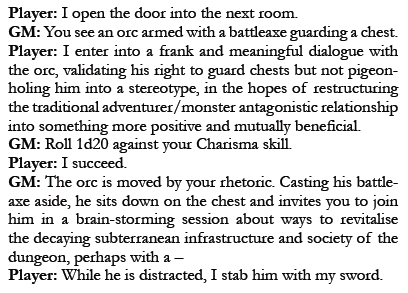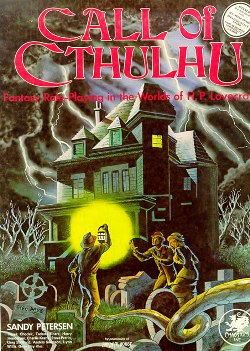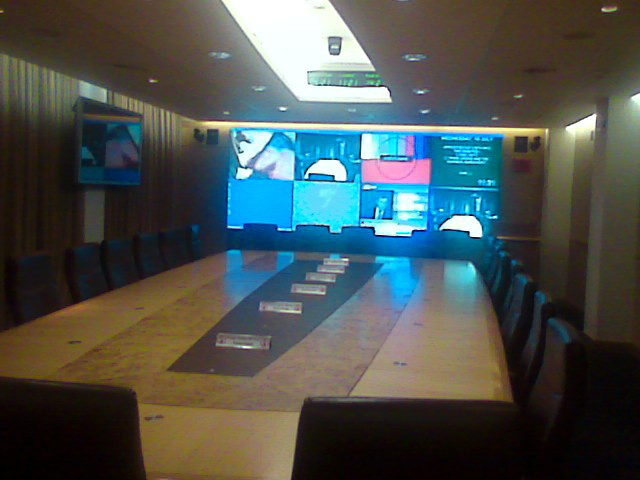The Laundry RPG by RocknRollaAyatollah
Introduction
Original SA post
Foreword
The foreword itself is written by Charles Stross and is pretty good. It’s an in-universe chat log of one of Bob’s superiors tasking him with researching this book. Apparently this CUBICLE SEVEN security coded document is a security threat to the Laundry. Someone has made a roleplaying game based on the UK’s paranormal intelligence agency and they need to do damage control on it. It also has to be checked out to make sure there are no summoning rituals in it. Bob will be given an appropriately warded room to playtest this document. Though he is offered personnel from Residual Human Resources, Bob asks for living subjects and materials to play an RPG. He has to fill out all the appropriate stationary requisition forms and they’ll look into requisitioning beer and pizza for test subjects.
After the foreword, the reader is given a new personnel orientation sheet. It welcomes them to the Laundry and gives them a basic introduction. All forms must be filled out properly and remember that the Laundry is ISO-9001 certified, please take no actions that could jeopardize that.
Chapter One: Capital Laundry Services
This is the proper introduction to the Laundry and a damn fine one at that.
The human race is a rather minor infestation on a small rock in a universe that’s largely empty. No God, gods, or other spiritual higher ups on this plane of existence than can be found. Not a lot of little green men running around either, they’re more like bugs, but they aren’t the real threat or numerous. The real threat to everything is the threat we can’t see, other worlds on top of this one. There are beings that exist in these dimensions that could rightfully be called gods and you should pray that you never catch their attention.
Throughout history, people have tried to do magic. Most of the time, it was just bunk. Magic before the 20th century was a lot of unnecessary rituals and superstition that rarely yielded results. Some people would get it right but this was rare. It’s one of the reasons why the world hasn’t been ended a million times over.
There has always been a strong association between sorcery and espionage, especially in Britain. It’s not really surprising that Britain would be at the forefront of this field once the charlatans made way for the real wizards.

This man was the greatest wizard who ever lived. His name was Alan Turing and he learned things that man was not meant to know. He’s also the father of the modern computer in real life, theorizing things like the Internet and artificial intelligence. He created the Church-Turing Theorem, which states that anything computable can be derived by a computer.
In 1941, Turing disproves his own theory. He comes up with a theory that there is a realm of platonic mathematics that intersects all realities. All mathematical principles are multiversal, meaning that the use of one equation can ripple into another plane of existence. Do the right equation and someone might knock back. This can result in fun stuff like what we consider magic but it can also open the doors for other things. Throughout the thousands of myriad universes, some are populated by malevolent entities that will hollow out your brain like a canoe and take you for a ride of terror throughout our material plane. Worst yet, they may open the door for something much worse. Don’t think about that too much, it can cause your head to explode. No really.
What Turing discovered got sent over to Strategic Operations Executive (SOE), the offensive side of British intelligence during the war. This would also begin the Laundry’s antagonistic relationship with Strategic Intelligence Services (SIS), who would go on to become MI-5. SOE were pretty much badasses, taking down the Nazis with resistance groups and parachuted in sorcerers.
The SS had their own occult division, Thule-Gesellschaft. They weren’t as advanced as the Allies in computation theory but they made up for this with good old-fashioned human sacrifice. You can jump start rituals with some ceremonial murder and the Nazis were able to do this in spades. The Holocaust itself is linked to the occult activities of the SS as well in a way that’s not hamfisted. It should be noted that the energy expended from a large number of deaths could be harnessed without it being planned for that purpose. The book later uses the 90’s famines in North Korea as a tool that the DPRK could use. A lot of the mad ramblings of Hitler in his final days had some truth in them, there were some war winning super weapons that could have been used.
The Allies win the war, democracy and totalitarian communism for everyone, and most of SOE is shelved. Well all of it is mothballed except the Laundry. The Laundry gains its name for being above a Chinese laundry mat in Soho. It now lives on to this day, saving Britain from the paranormal and being terribly underfunded. The Laundry is not only a spy agency but also a dumping ground for those who found out too much and a creative asylum for the insane. Just think of it like Norway’s prison system except they let you summon a few eldritch horrors for Queen and country.
At the Laundry you endure meetings, filling out forms, filing forms, arguing about budgets, and not catching the ire of Human Resources. Also remember, it’s not monolithic, it’s cyclopean! Oh yeah, sometimes you go on missions against the things that want to eat you and run away from them in a daring fashion.
Remember, for as bad it can be, it’s not as bad as CASE NIGHTMARE GREEN.
I’m no James Bond, with a sexy KGB minx trying to seduce me in every hotel room.
Original SA post
The Laundry Update: I’m no James Bond, with a sexy KGB minx trying to seduce me in every hotel room.
Chapter 2: How to Play
This is the standard, “What is roleplaying and how do you play this game?” section. It gives a pretty good example of roleplaying with a dialogue between the GM and a player.

The book tells you what you will need to play the game, what dice, and what to expect. This section isn’t too long and doesn’t take itself too seriously. It gives people what they might need and doesn’t waste time trying to paint this as something it’s not. I have really come to disregard these sections whenever I pick up a roleplaying game book but I guess some people still need this type of introduction to gaming. I’m sure there’s some young person out there who needs it and the book does an excellent job letting them know what this is.
Chapter 3: How to Play
This game uses the same system as Chaosium’s Call of Cthulhu , the Basic Role-playing System. This is the same system that RuneQuest uses. It’s about to get an update to 7th edition but this book was made before that went into beta testing. I’m sure once it’s out, you can convert it over because it’s not that big of a change. If you don’t like older roleplaying games, this might not be for you.
The Economics of Failure

It was a simpler time, when GM and player were locked in deadly combat and characters were ended with a single roll of the die.
Before I get into this, I want to point out that I’m not one of those grognards who gets off on having every game be a clusterfuck of failed rolls and instant deaths. If you run the Basic Role-Playing System the wrong way, it will be like that. Even if you don’t intentionally run it to be “Gygaxian” in tone, you can inadvertently make it that way. The system can be a lot of fun and works wonders when the game is not focused on one thing, combat. You want to avoid combat like the plague and here is why.
The Basic Role-Playing System is actually pretty basic as far as systems go, oddly enough. When you want to do something, you roll two d10’s as percentile dice. You will have a skill or characteristic ranked somewhere between 1-100. You will often have a small percentage in common skills to show that every person would have at least some competency. You only have to do skill tests like in most games when you’re in a situation where it’s not easily pulled off, such as running through an exploding hallway or explaining to your boss why the form they requested has only been signed in duplicate and not triplicate.
What this system means is that you’re going to fail a lot at the beginning and probably a fair deal once you’ve got experience into your character. It’s just the economics of a percentile-based system. It’s very similar to Dark Heresy, which is in many ways a modified version of the Basic System. If you have a 40 in Firearm (Handgun), you’re going to miss 60% of the time just shooting it at normal range without modifiers. You can double your percentile at point blank range for instance with firearms but this is basically Call of Cthulhu. Unless you’re fighting a knife wielding cultist, it’s probably going to be some unspeakable horror that cannot be described by stoic chalk white New England writers. Your chances of going toe to toe with a Dimensional Shambler or a Shoggoth are not good. The doubling will help you hit the target but then it becomes a question of if you can take down the target before it takes you down since it will probably have more health and some resistance. You’re just a human, it’s possibly a cube the size of a gorilla. The shotgun does a good job of damaging it but can you end its existence before it does whatever a giant cube does, probably envelope you like the big bubble from the Prisoner. You can also aim too but aiming takes time. That cube might be very fast.
Combat is deadly. At the most, you’re going to have 18 hit points without anything boosting it. Having 18 hit points means you’re John Atlas and probably spend most your time at the gym since you’re built like Brock Lesnar. You can wear armor and there’s some magic stuff that helps you. You can dodge and parry as well. So let’s put our man Lance Uppercut, human wall, in a fight. Lance, being a stereotype, forgot to bring his gun to what he assumed would be a fistfight. Lance is not wearing armor because Lance Uppercut needs no armor. He fails his dodge roll and he can’t parry a bullet. The shooter has a 35 in Firearms (Handguns) and is in point blank range so it’s doubled. The assailant rolls a 7, within the first 1/5 of his chance to hit so it’s a special success. He is shooting a Glock 17, which does 1d10 damage normally. Since he has a special success it’s an impale, which is like a critical hit. This means the bullet is lodged in Lance’s frame somewhere and does max damage, 10, on top of this normal 1d10 roll. We’ll say he rolls a 6 so Lance has just taken 16 damage, probably to some vital region. Lance’s player now has to roll on the major wound table because he’s taken more than half his hit point value in one lucky shot. This will probably cripple the character in some way. Lance will probably go into shock and meet his end if he’s not saved. I’m sure his assailant isn’t going to call an ambulance for him. This isn’t D&D either so your future after death is probably working for Residual Human Resources.
The way to surviving is running, which is not bad. This is what you’re supposed to do in a Lovecraft story. Lovecraft did not write pulp-fiction, he wrote weird fiction where all the characters usually run away and escape to tell their harrowing tale of monsters and evil minorities. The Laundry is not much different in this regard since most your characters will probably be bureaucrats or IT people. Bob’s tactic in the Atrocity Archives is pretty much to call for help and then leave his phone somewhere so the “the plumbers” can come save him. You are not less of a player for running, tell yourself this, you are not less of a player.
This is why the Basic Role-Playing System works for games like this. You’re not playing some medieval sociopath grave robber, you’re playing a darkly humorous investigation/spy game where your characters are part of an underfunded branch of Her Majesty’s Civil Service. They don’t pay you enough and the benefits are not worth the price that comes with gung-ho heroics. The forms you have to fill out anyways are a nightmare in and of themselves.
Nobody in the Laundry has ever had to get the Prime Minister out of bed in the small hours, but there’s always a first time.
Original SA post
As I said before, I’m going to skip through parts of this book and make it akin to the Delta Green rundown done earlier. Luckily, this book handles the fluff and dispensing it to readers very well.
Chapter 12: The Directory – “Nobody in the Laundry has ever had to get the Prime Minister out of bed in the small hours, but there’s always a first time”
This section details how the Laundry fits into the world of the UK’s security and intelligence agencies. The Laundry itself is not that much of a secret. Yes it’s not in plain sight but if you look for it, you can find bits and pieces about it. What the Laundry actually does and what they handle exactly is a mystery to pretty much everyone. There are people who are in the know but this is high-level clearance. The people who have this clearance as well don’t talk about it due to the level of secrecy it entails. This can be problematic when the shit hits the proverbial fan and no one’s sure who is exactly in the know.
The operational protocol of the Laundry is that any case that falls into the purview of another agency goes to that agency unless they don’t want to deal with it. Any case that involves Laundry specific stuff, such as an extra dimensional or magical component, or a “clear and present shoggoth” goes to the Laundry. This is not always clear-cut and there can be some extra agency feuds over jurisdiction. For instance, if some terrorists are trying to summon an extra dimensional force to wreck destruction on London, it’s not always considered a Laundry case. Laundry might have to come in for clean up but the actual handling of the case would be another agency unless they wish to give the Laundry jurisdiction.
The Laundry when it liaisons with other agencies follows the standard UK GOLD/SILVER/BRONZE command structure. GOLD is the director of the operation and usually handles things remotely from a headquarters or other standard agency post. GOLD level command positions are usually filled by high ranking administrators or ranking agents/officers of their agency. SILVER level is the field command. These agents/officers are usually in a mobile command vehicle or command post by the site of the incident. BRONZE level is the actual people in the field. These different levels can be manned by different agencies but usually both agencies are fully in the know as much as they need to be on the case at hand.
As far as threats go on a larger scale, the world is relatively lucky. The Helsinki Protocol, signed by the Allied Nations after WWII, banned the use of “unconventional” weaponry. This is why the Cold War was all about the conventional and nuclear arms race. If it wasn’t for the Protocol, things might have gone terribly wrong with an “Elder Gods” arms race. Terrorist organizations are reportedly about 5 years off from developing unconventional weapons but by then, none of that will matter. The world is ending before they probably even start alpha testing.

Her Majesty’s Government
The actual government of the UK is kept on a need to know basis. It’s not that they don’t trust your average member of the House of Commons; these guys can’t really handle it. Most tend to find it a downer when you bring up that a sudden world-shattering event will soon destroy much of the Earth and its population. The more esoteric bits of the Laundry purview don’t exactly mesh with the worldview of the average MP as well. This is one of the main reasons why the Laundry operates with little Parliamentary oversight. The Laundry does irregularly report to the Defence, Intelligence, and Security Committees. This is all buried within Whitehall so the average Laundry operative won’t interface with them unless something has gone terribly wrong.
COBRA (Cabinet Office, Briefing Room A)

Not that Cobra but the emergency co-ordination committee of the Prime Minister. The makeup of this committee depends on the crisis at hand and will be tailored to the situation. This committee wouldn’t be called for a Laundry operation unless civilian casualties would be high or the possibility of an, “The end is extremely fucking nigh” situation.
Joint Intelligence Committee
The JIC represents all of the UK’s intelligence committees, including the Laundry. The JIC directs the intelligence policy of the UK and advises the Prime Minister. A Laundry representative sits on the committee but this is all on the admin side of things.
The UK Intelligence Community
The Laundry is in many ways the red headed stepchild of the community. They are in many ways a relic of a bygone era that hasn't been swept away or incorporated into another agency because of their unique job. The Laundry also asks that you be as polite and professional as possible when working with other agencies. It is quite possible that agency rivalries and lack of belief in the extra dimensional threats that constantly assault our world may hinder your working with more mundane agencies.
This section is great too because it gives stats for generic agents of these agencies for the keeper to use.

Security Service (Defence Intelligence, Section 5; DI5)
Known to those within as DI5 and to those without as MI5. They are the domestic national security agency of the UK. In the past they focused on counter-espionage but with the end of the Cold War have switched their focus to terrorism. The Laundry and DI5 have a good working relationship so they tend to give the Laundry cases that fit their area of expertise.

Sorry, M, this was the only good image I could find.
Secret Intelligence Service (Defence Intelligence, Section 6; DI6)
Yes, that MI6. Yet again known to those within as DI6 but to those without as MI6. SIS and the Laundry have some bad blood between them left over from the war,
don't mention the war
, and they don't get along very well. SIS goes out of its way to make the Laundry look bad and they blame them for a lot of things. SIS also doesn't like the Laundry for its poor relationship with the Black Chamber. SIS gets along swimmingly with the CIA,
don't mention
that
war either
, and they share intelligence. The Black Chamber on the other hand makes the CIA look like Amnesty International so it's not exactly the Laundry's fault they have a poor relationship with them. SIS believes that the Laundry could possibly jeopardize the UK-USA Security Agreement so they're doing everything they can to stay in the cool kid's clique.

Government Communications Headquarters (GCHQ)
The GCHQ is pretty much the UK's equivalent of the NSA.
Sorry, I am a Yank after all.
GCHQ deals with signals intelligence and a great deal of computer related intelligence. The Laundry and GCHQ tend to get along pretty well and work great together which is pretty bad. There could be a strong case to merge about half of the Laundry into GCHQ and that's not something the Laundry wants. Laundry agents are ordered to not work too well with GCHQ. This means making unreasonable demands and throwing bureaucratic red tape at them. We can't allow for any bureaucratic cannibalism and bloodletting this close to CASE NIGHTMARE GREEN.
Defence Intelligence Staff (DIS)
The DIS collects and collates most intelligence from other agencies, such as HUMINT, satellite, drone, intercepted SIGINT, and so on. They're a military agency but they have a large civilian staff. The Laundry and DIS have an amiable though distant relationship. They exchange intelligence every now and then. The Laundry will also through them some intel from remote viewing and less traditional, paranormal, methods.
Next time we finish chapter 12 by covering European and police organizations. Then we move on to Chapter 13, counterparts and other organizations.
EDIT: I will go back and do some earlier chapters after I give a rundown of what it's like on the world stage. I skipped some things but I wanted to go over how the Laundry fits into the big picture first. After that I will focus on the Laundry, its equipment, requisitioning things, and the magic system.